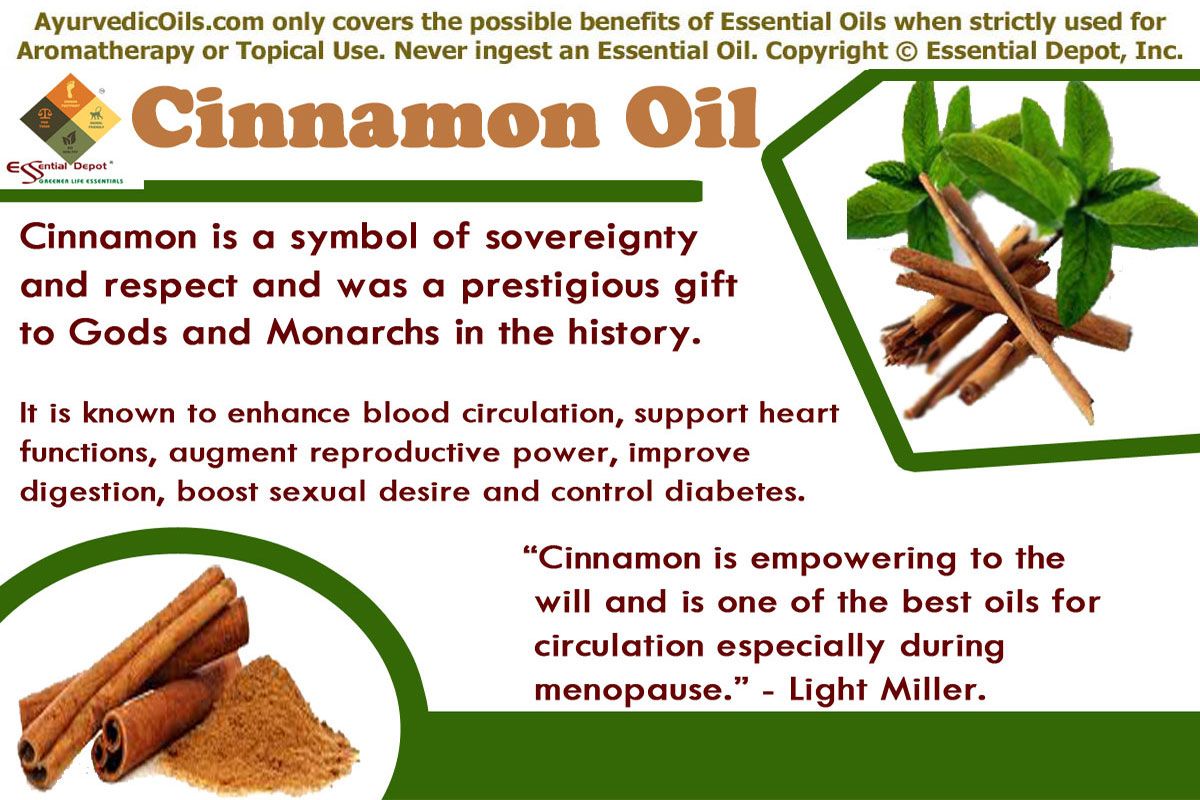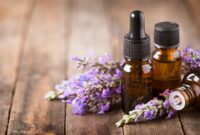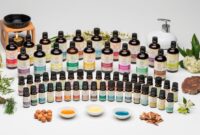Cinnamon aromatherapy, a captivating blend of ancient wisdom and modern science, invites us on a journey of aromatic exploration. From its historical origins to its multifaceted applications, this alluring practice offers a treasure trove of benefits for both body and soul.
The sweet, spicy aroma of cinnamon has been revered for centuries, transcending cultures and civilizations. Its use in aromatherapy dates back to ancient Egypt, where it was believed to possess divine powers. Today, cinnamon aromatherapy continues to enchant, providing a holistic approach to well-being.
Overview of Cinnamon Aromatherapy

Cinnamon aromatherapy is a holistic practice that utilizes the aromatic compounds of cinnamon to promote relaxation, improve mood, and alleviate various health conditions. It involves the inhalation or topical application of cinnamon essential oil, extracted from the bark of the cinnamon tree.
The history of cinnamon aromatherapy dates back to ancient times, with civilizations such as the Egyptians, Chinese, and Indians using cinnamon for its medicinal and aromatic properties. In traditional medicine, cinnamon was believed to have warming, stimulating, and antiseptic effects.
Methods of Cinnamon Aromatherapy
There are several methods of cinnamon aromatherapy, each with its unique benefits and applications:
- Inhalation:Inhaling cinnamon essential oil through a diffuser, steamer, or directly from the bottle can promote relaxation, reduce stress, and improve respiratory health.
- Topical application:Diluting cinnamon essential oil with a carrier oil, such as jojoba or coconut oil, allows for its application to the skin. This method can relieve muscle pain, improve circulation, and promote healthy skin.
Benefits of Cinnamon Aromatherapy
Cinnamon aromatherapy is believed to offer a range of physical and emotional benefits, including:
Physical Benefits
- Anti-inflammatory:Cinnamon essential oil contains compounds with anti-inflammatory properties, which may help reduce inflammation in the body and alleviate symptoms of conditions like arthritis and asthma.
- Antimicrobial:Cinnamon oil has antimicrobial and antifungal properties, which may help fight infections and promote wound healing.
- Antioxidant:Cinnamon is a rich source of antioxidants, which help protect the body against damage from free radicals.
- Immune-boosting:Cinnamon aromatherapy may help stimulate the immune system and protect against infections.
- Pain-relieving:Cinnamon oil has analgesic properties, which may help reduce pain and inflammation.
Emotional Benefits
- Mood-boosting:Cinnamon aromatherapy is known for its uplifting and energizing effects, which may help improve mood and reduce stress.
- Cognitive enhancement:Studies suggest that cinnamon aromatherapy may enhance cognitive function and improve memory.
- Anxiety-reducing:Cinnamon oil has calming and relaxing effects, which may help reduce anxiety and promote relaxation.
- Sleep-promoting:Cinnamon aromatherapy may help promote sleep and improve sleep quality.
- Libido-enhancing:Cinnamon is believed to have aphrodisiac properties, which may help increase libido and sexual desire.
Risks and Side Effects
While cinnamon aromatherapy is generally considered safe, there are some potential risks and side effects to consider:
- Skin irritation:Cinnamon oil can cause skin irritation in some individuals, especially if it is applied undiluted. It is important to dilute cinnamon oil with a carrier oil before applying it to the skin.
- Pregnancy:Cinnamon aromatherapy is not recommended during pregnancy, as it may stimulate uterine contractions.
- Interactions with medications:Cinnamon oil may interact with certain medications, such as blood thinners and diabetes medications. It is important to consult with a healthcare professional before using cinnamon aromatherapy if you are taking any medications.
Applications of Cinnamon Aromatherapy

Cinnamon aromatherapy has versatile applications across various settings, offering potential benefits for specific conditions and situations.
In homes, cinnamon essential oil can be diffused to create a warm and inviting atmosphere, promoting relaxation and reducing stress. It can also be added to cleaning solutions for its antimicrobial properties.
Healthcare Settings
- Pain Management:Cinnamon aromatherapy may alleviate pain associated with headaches, muscle aches, and arthritis.
- Nausea and Vomiting:Inhaling cinnamon aroma has shown promise in reducing nausea and vomiting, particularly during chemotherapy.
- Antimicrobial Effects:Cinnamon essential oil possesses antimicrobial properties that can help combat infections and promote wound healing.
Complementary and Alternative Medicine
Cinnamon aromatherapy is gaining recognition as a complementary therapy alongside conventional medicine. It may support:
- Immune System Boost:Cinnamon’s antioxidant and antibacterial properties may enhance immune function.
- Mood Enhancement:Inhaling cinnamon aroma has been associated with improved mood and reduced anxiety.
- Blood Sugar Regulation:Some studies suggest that cinnamon aromatherapy may aid in regulating blood sugar levels.
Essential Oil Extraction and Properties

Cinnamon essential oil is extracted from the bark of the cinnamon tree through a process called steam distillation. During this process, steam is passed through the cinnamon bark, causing the volatile compounds within the bark to vaporize. These vapors are then condensed back into a liquid, which separates into two layers: the essential oil and water.
Cinnamon essential oil is composed of a variety of chemical compounds, including cinnamaldehyde, eugenol, and linalool. These compounds give cinnamon essential oil its characteristic aroma and flavor, as well as its therapeutic properties.
Chemical Composition and Properties
- Cinnamaldehyde: This compound is responsible for the spicy, warm aroma of cinnamon essential oil. It has antibacterial, antifungal, and antioxidant properties.
- Eugenol: This compound gives cinnamon essential oil its sweet, slightly spicy flavor. It has anti-inflammatory and analgesic properties.
- Linalool: This compound contributes to the floral, slightly citrusy scent of cinnamon essential oil. It has calming and sedative properties.
Factors Affecting Quality and Potency
The quality and potency of cinnamon essential oil can be affected by several factors, including:
- The type of cinnamon tree used: There are several different species of cinnamon trees, and each species produces a slightly different essential oil.
- The age of the tree: The bark of older trees contains a higher concentration of essential oils.
- The growing conditions: The climate and soil conditions in which the cinnamon tree is grown can affect the quality of the essential oil.
- The extraction method: The steam distillation process can be varied to produce essential oils with different properties.
Blending Cinnamon Essential Oil: Cinnamon Aromatherapy
Cinnamon essential oil offers a versatile and potent aroma that can be enhanced when blended with other essential oils. Whether you seek relaxation, invigoration, or specific therapeutic benefits, blending cinnamon essential oil allows for customization and synergy.
Dilution and Safety Precautions
When blending essential oils, dilution is crucial for safety and effectiveness. Essential oils are highly concentrated and can cause skin irritation or other adverse effects if used undiluted. It’s recommended to dilute cinnamon essential oil with a carrier oil, such as jojoba, almond, or coconut oil, before applying it topically.
Additionally, it’s essential to research and consider any potential contraindications or interactions with other essential oils or medications before blending. Consult a qualified aromatherapist or healthcare professional if you have any concerns.
Creating Custom Aromatherapy Blends
The possibilities for blending cinnamon essential oil are endless, allowing you to create unique aromatherapy blends tailored to your specific needs. Here are some tips for crafting your own blends:
- Start with a small amount:Begin with a few drops of cinnamon essential oil and gradually increase the amount as desired, ensuring the blend remains diluted and safe.
- Experiment with different oils:Cinnamon essential oil blends well with a variety of other oils, including citrus oils (such as orange or grapefruit), spicy oils (such as ginger or clove), and floral oils (such as lavender or rose).
- Consider the purpose:Think about the intended purpose of your blend. For relaxation, consider blending cinnamon with lavender or chamomile. For invigoration, try blending it with rosemary or peppermint.
Cinnamon Aromatherapy Products

Cinnamon aromatherapy products encompass a wide range of items that harness the therapeutic benefits of cinnamon essential oil. These products offer diverse ways to experience the aroma and properties of cinnamon, catering to various preferences and applications.
Types of Cinnamon Aromatherapy Products
Cinnamon aromatherapy products come in various forms, each offering unique advantages:
- Candles:Cinnamon-scented candles create a warm and inviting ambiance, releasing the aroma into the air for a relaxing or stimulating effect.
- Diffusers:Diffusers disperse cinnamon essential oil into the air, allowing for inhalation of its therapeutic properties. They can be used for aromatherapy purposes or to freshen up a space.
- Body Care Products:Cinnamon is incorporated into body care products such as soaps, lotions, and massage oils, providing topical benefits for skin and muscle health.
Reputable Brands and Products
Choosing high-quality cinnamon aromatherapy products is essential for optimal results. Here are some reputable brands and products to consider:
- Aura Cacia:Known for its pure and potent essential oils, Aura Cacia offers a Cinnamon Essential Oil that can be used in diffusers or blended into carrier oils.
- Edens Garden:Edens Garden provides a Cinnamon Bark Essential Oil that is certified organic and steam distilled for maximum purity.
- Plant Therapy:Plant Therapy’s Cinnamon Leaf Essential Oil is sourced from sustainable farms and undergoes rigorous testing to ensure quality.
Considerations for Choosing High-Quality Products
When selecting cinnamon aromatherapy products, consider the following factors:
- Purity:Ensure the products are made with 100% pure cinnamon essential oil, free from synthetic fragrances or additives.
- Source:Choose products from reputable brands that disclose the source and extraction method of the cinnamon oil.
- Packaging:Look for products packaged in dark glass bottles to protect the oil from degradation caused by light exposure.
- Reviews:Read customer reviews and testimonials to gauge the effectiveness and quality of the products.
Last Point

As we delve into the world of cinnamon aromatherapy, we uncover a tapestry of possibilities. From enhancing relaxation to alleviating discomfort, this aromatic practice empowers us to harness the transformative power of nature. Whether you seek to create a serene sanctuary in your home, elevate your spa experience, or explore the realm of alternative medicine, cinnamon aromatherapy stands ready to guide you on a fragrant journey of healing and rejuvenation.
Key Questions Answered
What are the key benefits of cinnamon aromatherapy?
Cinnamon aromatherapy is renowned for its myriad benefits, including reducing stress, improving mood, boosting immunity, alleviating pain, and enhancing cognitive function.
How can I incorporate cinnamon aromatherapy into my daily routine?
There are several ways to enjoy the benefits of cinnamon aromatherapy. You can diffuse cinnamon essential oil in your home, apply it topically diluted with a carrier oil, or add a few drops to your bathwater.
Are there any precautions I should take when using cinnamon aromatherapy?
Cinnamon essential oil is generally safe for most people, but it is essential to dilute it with a carrier oil before applying it to the skin. Avoid using cinnamon essential oil if you are pregnant or breastfeeding.


